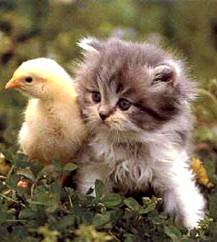KITTEN
DEVELOPMENT
Most cats are still considered kittens during
the first two years of their lives, in both mind and body. During
this time, they go through several different stages of development.Kittens
should ideally stay with their littermates for at least the first 12 weeks of their
lives. There are many things that a kitten learns from her mother
and littermates during the first eight weeks, skills which, if not
acquired during that time, may be lost forever. Many of these are
social skills. In fact, kittens of well-socialized mothers are more
likely to be well-socialized themselves as they will follow their
mother's lead when it comes to interacting with people. From their
littermates, kittens learn other social skills like appropriate
play and inhibited biting. Further, it's been shown that kittens
who are handled during the first seven weeks on a daily basis are
more likely to develop larger brains, making them better learners
as well as more exploratory and playful.Below is a general guideline
for the stages of development that a kitten goes through:Age 0 to
2 weeks: Neonatal. During this time, kittens are learning to orient
themselves toward sound and their eyes usually open by two weeks
of age. Also, kittens begin competing within the litter for rank
and begin to develop territory. Kittens who are separated form their
mother and littermates at this time may develop problems like aggression
toward people and other pets and poor learning skills.
stay with their littermates for at least the first 12 weeks of their
lives. There are many things that a kitten learns from her mother
and littermates during the first eight weeks, skills which, if not
acquired during that time, may be lost forever. Many of these are
social skills. In fact, kittens of well-socialized mothers are more
likely to be well-socialized themselves as they will follow their
mother's lead when it comes to interacting with people. From their
littermates, kittens learn other social skills like appropriate
play and inhibited biting. Further, it's been shown that kittens
who are handled during the first seven weeks on a daily basis are
more likely to develop larger brains, making them better learners
as well as more exploratory and playful.Below is a general guideline
for the stages of development that a kitten goes through:Age 0 to
2 weeks: Neonatal. During this time, kittens are learning to orient
themselves toward sound and their eyes usually open by two weeks
of age. Also, kittens begin competing within the litter for rank
and begin to develop territory. Kittens who are separated form their
mother and littermates at this time may develop problems like aggression
toward people and other pets and poor learning skills.
Age
2 to 7 weeks: Socialization.
By week three, the  sense
of smell is well developed and the sense of sight develop enough
whereas kittens can recognize and find their mother. By week four,
the sense of smell is fully mature while the sense of hearing is
well developed. At this time, the teeth are erupting, kittens can
walk fairly well, and they begin to interact with their littermates.
By week five, the sense of sight is fully mature. Further, kittens
are able to right themselves, place their feet precisely, avoid
obstacles, stalk and pounce, and even run. They also begin grooming
themselves and others. Adult sleeping patterns, social interaction
and motor abilities are beginning to develop by weeks six and seven. sense
of smell is well developed and the sense of sight develop enough
whereas kittens can recognize and find their mother. By week four,
the sense of smell is fully mature while the sense of hearing is
well developed. At this time, the teeth are erupting, kittens can
walk fairly well, and they begin to interact with their littermates.
By week five, the sense of sight is fully mature. Further, kittens
are able to right themselves, place their feet precisely, avoid
obstacles, stalk and pounce, and even run. They also begin grooming
themselves and others. Adult sleeping patterns, social interaction
and motor abilities are beginning to develop by weeks six and seven.

Age 7 to 14 weeks: Active Play.
During this time, kittens partake in social and object play,
which increases their social skills and physical coordination. Most
of a kitten's learning occurs by observation, and this is preferably
through observation of their mother. This social and object play
may include the following: hugging, ambushing, licking, scooping,
tossing, pawing, mouthing, holding, tail chasing, leaping, and pouncing.
 Age
3 to 6 months: Ranking. During this time, kittens
are most influenced by their ‘littermates', which now includes
human, and they begin to understand and put to use ranking within
the pack or household. Age
3 to 6 months: Ranking. During this time, kittens
are most influenced by their ‘littermates', which now includes
human, and they begin to understand and put to use ranking within
the pack or household.

Age 6 to 18 months: Adolescence. During this
time, sexual behavior begins if the kitten has not been spayed or
neutered. Kittens also begin to further explore dominance and may
challenge humans.
|



![]()
![]()
![]()
 stay with their littermates for at least the first 12 weeks of their
lives. There are many things that a kitten learns from her mother
and littermates during the first eight weeks, skills which, if not
acquired during that time, may be lost forever. Many of these are
social skills. In fact, kittens of well-socialized mothers are more
likely to be well-socialized themselves as they will follow their
mother's lead when it comes to interacting with people. From their
littermates, kittens learn other social skills like appropriate
play and inhibited biting. Further, it's been shown that kittens
who are handled during the first seven weeks on a daily basis are
more likely to develop larger brains, making them better learners
as well as more exploratory and playful.Below is a general guideline
for the stages of development that a kitten goes through:Age 0 to
2 weeks: Neonatal. During this time, kittens are learning to orient
themselves toward sound and their eyes usually open by two weeks
of age. Also, kittens begin competing within the litter for rank
and begin to develop territory. Kittens who are separated form their
mother and littermates at this time may develop problems like aggression
toward people and other pets and poor learning skills.
stay with their littermates for at least the first 12 weeks of their
lives. There are many things that a kitten learns from her mother
and littermates during the first eight weeks, skills which, if not
acquired during that time, may be lost forever. Many of these are
social skills. In fact, kittens of well-socialized mothers are more
likely to be well-socialized themselves as they will follow their
mother's lead when it comes to interacting with people. From their
littermates, kittens learn other social skills like appropriate
play and inhibited biting. Further, it's been shown that kittens
who are handled during the first seven weeks on a daily basis are
more likely to develop larger brains, making them better learners
as well as more exploratory and playful.Below is a general guideline
for the stages of development that a kitten goes through:Age 0 to
2 weeks: Neonatal. During this time, kittens are learning to orient
themselves toward sound and their eyes usually open by two weeks
of age. Also, kittens begin competing within the litter for rank
and begin to develop territory. Kittens who are separated form their
mother and littermates at this time may develop problems like aggression
toward people and other pets and poor learning skills. sense
of smell is well developed and the sense of sight develop enough
whereas kittens can recognize and find their mother. By week four,
the sense of smell is fully mature while the sense of hearing is
well developed. At this time, the teeth are erupting, kittens can
walk fairly well, and they begin to interact with their littermates.
By week five, the sense of sight is fully mature. Further, kittens
are able to right themselves, place their feet precisely, avoid
obstacles, stalk and pounce, and even run. They also begin grooming
themselves and others. Adult sleeping patterns, social interaction
and motor abilities are beginning to develop by weeks six and seven.
sense
of smell is well developed and the sense of sight develop enough
whereas kittens can recognize and find their mother. By week four,
the sense of smell is fully mature while the sense of hearing is
well developed. At this time, the teeth are erupting, kittens can
walk fairly well, and they begin to interact with their littermates.
By week five, the sense of sight is fully mature. Further, kittens
are able to right themselves, place their feet precisely, avoid
obstacles, stalk and pounce, and even run. They also begin grooming
themselves and others. Adult sleeping patterns, social interaction
and motor abilities are beginning to develop by weeks six and seven.

 Age
3 to 6 months: Ranking. During this time, kittens
are most influenced by their ‘littermates', which now includes
human, and they begin to understand and put to use ranking within
the pack or household.
Age
3 to 6 months: Ranking. During this time, kittens
are most influenced by their ‘littermates', which now includes
human, and they begin to understand and put to use ranking within
the pack or household. 
